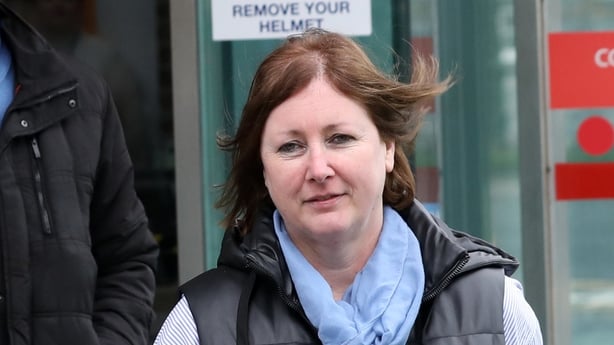The Association of Garda Sergeants and Inspectors (AGSI) has called on the Garda Commissioner to withdraw a directive to members of the gardaí on gender identity in the workplace and adhere to the established industrial relations process for the garda roster.
140 Garda Sergeants and Inspectors met in Galway for their annual conference to discuss 24 motion with rosters and gender identity top of the agenda.
The AGSI has called on Commissioner Drew Harris to adhere to the established industrial relations process for garda dispute resolution and is protesting his decision to refer the issue of garda rosters to the Workplace Relations Commission (WRC).
The association says it made a number of suggestions to resolve the current impasse, all of which have been rejected.
Sergeants and Inspectors are also calling for the withdrawal of the recent Directive of Gender Identity in the Workplace, relating to the rights of people who are transitioning, because it has been introduced without consultation or training.
Commissioner Harris has said that gardaí who use the wrong gender when addressing a person may be disciplined.
The AGSI had also strongly criticised Sinn Féin TD Eoin Ó Broin for posting an image of a famine era eviction, reworked to include private security officers and gardaí.
Mr Ó Broin has today said it was not his intention to "offend, criticise or drag An Garda Síochána into a political controversy".
This afternoon, the Dublin Mid-West TD said he had a "very positive phone conversation" with Antoinette Cunningham, General Secretary of the Association of Garda Sergeants and Inspectors.
Ms Cunnigham said the phone call offered "important and welcome clarity", which she will communicate to association members tomorrow.

Minister for Justice Simon Harris will tell the conference it is "particularly dangerous" because it "increases the risk of aggression" towards gardaí at a time when attacks on them are increasing.
Speaking on RTÉ's Morning Ireland, Ms Cunningham said the AGSI will ask the Commissioner to re- clarify the role that gardai play at evictions so that members can be "very clear" in their role.
She said the garda role at an eviction is to prevent a breach of peace from occuring.
Ms Cunningham said if Mr O'Broin wanted to criticise government and not gardai then he should have made that clear in the words preceding the image.
"It is very wrong for politicans to set society against gardai because that's not helpful," she said.
"Gardai have a very difficult job to do and inciting anger towards our members by politicans is really unhelpful."
Ms Cunningham added that she was very disappointed that there did not appear to be any resolution in sight to the roster dispute.
The AGSI made three suggestions to the Garda Commissioner on the issue last week, she said, and all three suggestions were rejected.
She said the AGSI would again ask Mr Harris to re-open negotiations when he addresses the conference tomorrow.
"It's our belief that this can only be resolved through negotiation," she added.
Delegates also want the Garda Commissioner to set up a working group to establish why so many gardaí are leaving the force, to issue Standard Operating Procedures to garda control centres on how to process and dispatch calls for assistance from other emergency services and to provide formal training and equipment to Divisional Protective Units on the classification of images gathered in investigations for examination by the Computer Crime Unit.
Sergeants and Inspectors also do not want to be involved as a Court Presenter or Prosecutor in respect of any court proceedings against any serving garda and say these cases should be presented and prosecuted by State Solicitor.
They also want training in the use of less lethal devices for members attached to the Divisional Roads Policing Units to ensure a faster, graded response to confrontational incidents with a risk of violence and want a Mark-9 OC spray canister, a taser and associated cartridges and a garda shield to be in all garda vehicles.
The minister will also tell the conference that forthcoming new Criminal Assets Bureau legislation will mean courts will automatically appoint a receiver to a property once it has been declared the proceeds of crime.
Minister Harris says this means that the property will no longer be available for use by the person being pursued by CAB and prevent criminals continuing to employ "delaying tactics to challenge CAB" and continue to enjoy the use of their assets.
The Proceeds of Crime (Amendment) Bill 2023 will also reduce the period that criminal proceeds may be confiscated from seven years to two years and grant further powers to the CAB to allow it more effectively share information with other State agencies and with law enforcement in other jurisdictions.
It will also grant anonymity to former non-garda Bureau Officers, other former bureau staff, experts from regulatory or investigative bodies or independent experts, such as financial analysts, occasionally contracted by the bureau, when called upon to give evidence at proceeds of crime hearings.
The Bill is due before the Oireachtas in June.







